THE U.N. MUST INVESTIGATE IRAN'S 1988 MASSACRE, OR DETAINED PROTESTERS TODAY FACE SAME FATE
BY TAHAR BOUMEDRA
The United Nations (U.N.) is often criticized for not acting or not intervening promptly to rescue victims of gross violations of human rights. This is an observation I came to register when I was in the field as chief of the U.N. Human Rights Office in Iraq.
This week, I will attend a civil society hearing in Geneva for the purpose of investigating the 1988 massacre of political prisoners in Iran, yet another case where the global body of nations failed to act in a timely manner.
Nearly 30 years after the massacre of as many as 30,000 political prisoners, a group of NGOs are holding a civil society hearing to investigate this atrocity for the first time, next door to the U.N. headquarters in Geneva. Survivors of the massacre, relatives of victims and human rights experts will present testimonies and reflect on the way forward.
This hearing couldn't be more timely, given the perilous fate that awaits the several thousand Iranians who have been arbitrarily arrested since late December 2017, when nationwide protests that sought an end to the theocratic dictatorship began in the country.
So far, 10 protesters have been reportedly tortured to death in prison, although the regime rejects the claims and said most "committed suicide" in the country's jails.
But Iran's regime is notorious for purging its opponents secretly in prison, and the most emblematic case is the 1988 massacre.
At the time, the Islamic Republic's Supreme Leader Ayatollah Khomeini had been forced to accept the terms of a ceasefire in the Iran-Iraq War. Fearing that an end to external hostilities would give rise to opposition voices challenging the clerics' chaotic management of domestic affairs, Khomeini decided to immediately purge organized opposition.
Within days, he issued a fatwa to the effect that all prisoners who remained steadfast in their support for the opposition People's Mojahedin (PMOI or MEK) were "waging war on God" and "condemned to execution."
In his decree, Khomeini ordered the formation of three-member panels, known as "Death Commissions," throughout the country to implement his order of executing all political prisoners who remained loyal to their belief and political affiliation. Kangaroo trials of prisoners lasted mere minutes.
UN High Commissioner asks his office to look ‘deeper’ into Iran’s 1988 massacre
Zeid Ra’ad Al Hussein, the United Nations High Commissioner for Human Rights, has said that he has asked his office to conduct a deeper investigation into the 1988 massacre of political prisoners in Iran.
Taking questions via a Twitter Question and Answer session on 10 December 2017 to mark International Human Rights Day, the High Commissioner said that he had recently been briefed on the issue.
Numerous questions were posed to the High Commissioner about how the UN plans to end the impunity surrounding the 1988 massacre during the Twitter Q&A using the hashtag #AskZeid. They included questions from lawmakers, jurists, human rights activists and journalists in addition to Iranians, including family members of the victims of the massacre.
The High Commissioner pointed out that the UN ought to respond to “alleged atrocities on this scale”.
More than 30,000 political prisoners were massacred in a few weeks in the summer of 1988 based on a fatwa by Ayatollah Khomeini.
Conference in the Senate of Italy, Call for Justice Over the 1988 Massacre of Political Prisoners in Iran
 A conference was held in the Senate of Italy titled “Justice for the Massacre of 30,000 political prisoners and more than 80 women executed since the Iran regime’s president, Hassan Rouhani is in office.” At the conference, speakers called for the prosecution of perpetrators of the 1988 massacre for committing crimes against humanity.The meeting was held on Wednesday, October 18, in the presence of Senator Silvana Amati, board member of the Italian Senate and Italian parliamentarians and political figures and human rights activists. The speakers emphasized the need for an UN-led inquiry into the massacre of political prisoners in Iran.
A conference was held in the Senate of Italy titled “Justice for the Massacre of 30,000 political prisoners and more than 80 women executed since the Iran regime’s president, Hassan Rouhani is in office.” At the conference, speakers called for the prosecution of perpetrators of the 1988 massacre for committing crimes against humanity.The meeting was held on Wednesday, October 18, in the presence of Senator Silvana Amati, board member of the Italian Senate and Italian parliamentarians and political figures and human rights activists. The speakers emphasized the need for an UN-led inquiry into the massacre of political prisoners in Iran.
Bob Blackman MP: Securing international inquiry into the 1988 massacre will win over the Iranian people
Earlier in September, the UN Secretary General sent the latest report of the Special Rapporteur on Iran’s human rights to the General Assembly for discussion. The August 14 report provides a detailed account of a series of serious abuses that were carried out by the Iranian authorities in the past year year.
But this year's report is unique compared with previous reports because the Special Rapporteur highlights the massacre of thousands of political prisoners in 1988. The report documents the direct involvement of senior Iranian officials and current ministers in carrying out and defending these mass executions as well as the authorities’ efforts to destroy evidence of mass graves and to harass, intimidate and prosecute those who seek truth and justice.
Q&A BY STRUAN STEVENSON, WITH PMOI WEBSITE
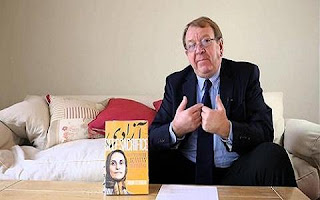 Struan Stevenson, was a member of the European Parliament (MEP) for Scotland from 1999-2014. During that time, he chaired the Friends of a Free Iran intergroup, which became the centre of pro-democracy campaigns in Europe in support of human rights in Iran. He also chaired European Parliament’s official Delegation for Relations with Iraq. He has written several books on different topics including a book called Self Sacrifice,originally in English and translated to French and German, which explains about the Iranian resistance.
Struan Stevenson, was a member of the European Parliament (MEP) for Scotland from 1999-2014. During that time, he chaired the Friends of a Free Iran intergroup, which became the centre of pro-democracy campaigns in Europe in support of human rights in Iran. He also chaired European Parliament’s official Delegation for Relations with Iraq. He has written several books on different topics including a book called Self Sacrifice,originally in English and translated to French and German, which explains about the Iranian resistance.
Iran Regime Must Be Brought to Justice Over 1988 Massacre
The Iranian Regime is responsible for one of the most horrific crimes against humanity of the 20th Century but the international community has largely met this with silence.
In 1988, the Iranian Regime slaughtered around 30,000 political prisoners, mainly members and supporters of the leading Iranian opposition movement, the People’s Mojahedin Organization of Iran.
Yet no one has ever been brought to justice.
Nasser Sharif, president of the California Society for Democracy in Iran, wrote an op-ed for the Orange County Register explaining why the international community cannot allow the Iranian mullahs to get away with their crimes any longer.
He wrote: “Secrecy was reinforced for several decades by a conspiracy of silence orchestrated by the clerical regime. So, despite the tremendous human cost, the episode effectively went unacknowledged. Any call in Iran for an investigation was severely punished.”
Indeed, while the people who committed these vile crimes were rewarded with high-ranking positions in the Regime, those who spoke out against them were punished with imprisonment, torture, or execution.
Sharif cites the case of the late Ayatollah Hossein Ali Montazeri, former second-in-command in the Regime, who recorded himself condemning the Death Committee members for their roles in “the greatest crime of the Islamic Republic”.
He was demoted and put under house arrest until his death in 2009. When his son Ahmad released the audio recording last year, he was jailed for acting against the Regime.
While Maryam Akbari Monfared, a political prisoner who demand to know what happened to her siblings in 1988, is being denied vital medical care.
After 1988 massacre, Iranian political prisoners still await justice
The Hull:By Sir David Amess
Earlier this month, I was honored to be able to speak to a rally of the Anglo-Iranian communities in Trafalgar Square, who had gathered in memoriam for the 30,000 political prisoners who were killed in a massacre that ended in Iran around this time 29 years ago.
Khomeini
Khomeini's 'Death Decree' for mass executions of Iranian political prisoners in 1988.
The mass executions primarily targeted members and supporters of the Iranian opposition, the People’s Mojahedin Organisation of Iran (PMOI), following a fatwa by the founder the Islamic Republic, Khomenei, in which he declared that all remaining opponents of the clerical regime were guilty of “waging war against God” and should be summarily executed.
The fatwa led to the establishment of “death committees” in major cities throughout Iran, which sentenced PMOI activists to hang after trials that lasted as little as one minute. These actions sought to totally stamp out the pro-democratic opposition, but the PMOI continues to thrive even today, now as the main constituent organization in the broader Iranian coalition known as the National Council of Resistance of Iran (NCRI).
The Trafalgar Square rally was part of an international campaign with similar rallies by the Iranian expatriates in Europe and North America to frame the weeks-long commemoration of the 1988 massacre.
The main such gathering is the NCRI’s annual gathering in Paris, which took place only July 1 this year and attracted an estimated 100,000 people, including Western politicians who are active supporters of the NCRI.
I am proud to say that I am among those who were present at both that and the more recent rally to urge justice for the victims and survivors of the massacre. I have also watched closely in the intervening two months, to see the ongoing Iranian human rights crisis continue to evolve, both in terms of the regime’s abuses and the domestic and international response to them.
Iran Remembers the Murderous Summer of 1988
By Shabnam Madadzadeh
When Iran’s President Hassan Rouhani speaks to the United Nations Wednesday, I will be thinking about the events of 1988, which the regime has tried to erase from history. In school our lessons contained no reference to that summer of blood. But I heard one firsthand story in 2012 from Maryam Akbari Monfared while we were both being held in Tehran’s Evin Prison for our political activities.
“They brought my brother’s belongings—a bag containing his clothes, bloodied and torn from torture,” I recall Ms. Akbari saying. “I will never forget that moment. My parents had gone to visit him, returning instead with his effects. Neither of them could talk. As if they had no words to describe that horrible scene.” By 1988 her brother had been a prisoner for eight years. She said he had been arrested at age 17 for distributing the opposition newspapers of the Mujahedin-e Khalq, or MEK.
The look on Ms. Akbari’s face conveyed the whole scene: the grim mother and father, with no corpse to bury or grave to mourn over. “We will not let this be forgotten,” she whispered.
I am an Iranian political activist. In 2009, as a 21-year-old university student, I was arrested on suspicion of being sympathetic to the opposition. For five years I languished in prison, three months in solitary confinement. Two years after being released in 2014, I was smuggled out of the country by the MEK.
Although the regime has tried to force Iranians to forget 1988, the crimes committed were so vast that this was impossible. An estimated 30,000 people, mainly MEK activists, were executed. Their “trials” usually lasted minutes.
How could their families possibly forget? Before my arrest I met a young woman whose uncle was executed that summer. “To this day,” I remember her telling me, “my entire family stands up in respect whenever his name is mentioned. My uncle was the most human of humans.”
HUMAN RIGHTS ARE KEY TO CONFRONTING IRAN
by:Ken Blackwell
|Commendably, the Trump administration is set to initiate a new Iran policy, which will be announced in October. Such change is imperative.The flawed nuclear agreement in 2015, provided too many concessions, including tens of billions of dollars to the Iranian regime, following decades of deceit and lying in pursuit of the nuclear bomb.Tehran’s nuclear program continues, and its military sites remain off limits to inspectors.
But more than that, the Obama administration’s agreement has resulted in more egregious conduct by the ayatollahs, in terms of sponsoring terror and Islamic extremism, cooperating with North Korea in pursuit of ballistic missiles, and cracking down on domestic dissent.
The new policy will reportedly include clipping the Iranian regime’s wings in Syria and Iraq, plus more pressure on Tehran in response to its repeated ballistic missile tests.
During her White House press briefing alongside National Security Advisor H.R. McMaster on September 15, the US Ambassador to the United Nations, Nikki Haley articulately said: “Now more than ever, human rights matters. We say all the time if the government does not take care of its people, bad things will happen.”
 Striking Street Display and Exhibition Illustrating the Terrible State of Human Rights in Iran Iranians and supporters of the Iranian resistance held an elaborate street display and exhibition depicting the appalling state of human rights in Iran in front of the Palais des Nations, the United Nations European Headquarters in Geneva on Friday, September 15.The exhibition highlighted the massacre of 30,000 political prisoners, overwhelming majority of them activists of the People’s Mojahedin Organization of Iran (PMOI/MEK), in summer of 1988 on the basis of a fatwa issued by Ruhollah Khomeini, the founder of the Islamic Republic.
Striking Street Display and Exhibition Illustrating the Terrible State of Human Rights in Iran Iranians and supporters of the Iranian resistance held an elaborate street display and exhibition depicting the appalling state of human rights in Iran in front of the Palais des Nations, the United Nations European Headquarters in Geneva on Friday, September 15.The exhibition highlighted the massacre of 30,000 political prisoners, overwhelming majority of them activists of the People’s Mojahedin Organization of Iran (PMOI/MEK), in summer of 1988 on the basis of a fatwa issued by Ruhollah Khomeini, the founder of the Islamic Republic.They urge European governments and the EU, to condition relations with Islamic Republic of Iran, to a suspension of executions and a clear progress on human rights
On Wednesday, 13 September 2017, the Friends of a Free Iran in the European Parliament (FOFI), held a conference at the headquarters of the European Parliament in Strasbourg with the participation of dozens of MEPs. They called on the Council of the European Union, the member states and the High Representative of the European Union, Mrs. Federica Mogherini, to end silence and inaction with respect to the brutal violation of human rights in Iran. In particular, they called for an independent investigation by the United Nations into the massacre of 30,000 political prisoners in Iran in 1988 and the preparation of the trial for those responsible for this crime.
The meeting was moderated by Gérard Deprez MEP (ALDE Group), chair of FOFI, which has the support of around 300 parliamentarians from various political groups and countries. In this meeting, Mohammad Mohaddessin, chairman of the Foreign Affairs Committee of the political coalition, the National Council of Resistance of Iran was the guest speaker and several members of the European Parliament took part in the discussions.
READ MORE
European officials urge probe for 1988 massacre of political prisoners in Iran
By Shahin Gobadi Special to Al Arabiya English
In a conference held at the United Nations' Geneva headquarters this week, European politicians, prominent jurists and human rights defenders urged the UN to immediately set up an independent commission to investigate Iran’s 1988 massacre of political prisoners and to bring the officials who were responsible for this crime to justice.
They stressed that this measure should be adopted during the current session of the UN General Assembly.
The conference was organized by several respected NGOs and coincided with the 36th session of the UN Human Rights Council.
In summer of 1988, some 30,000 political prisoners, the overwhelming majority of them activists of the People’s Mojahedin Organization of Iran (PMOI/MEK) were massacred within the span of a few months on the basis of a fatwa issued by Ruhollah Khomeini, the founder of the Islamic Republic.
There has never been an independent international investigation of the massacre, which according to many legal experts constitutes one of the biggest crimes against humanity since World War II.
In her latest report, Asma Jahangir, the special rapporteur on the situation of human rights in Iran, raised the issue of the 1988 massacre and thus broke the UN’s 28-year silence on the issue.
“Between July and August 1988, thousands of political prisoners, men, women and teen-agers, were reportedly executed pursuant to a fatwa issued by the then Supreme Leader, Ayatollah Khomeini. A three-man commission was reportedly created with a view to determining who should be executed. The bodies of the victims were reportedly buried in unmarked graves and their families never informed of their whereabouts. These events, known as the 1988 massacres, have never been officially acknowledged,” wrote the UN rapporteur.
Thursday, 14 September 2017
 NCRI - On Thursday September 14, 2017. A conference was held in the United Nations in Geneva on the situation of human rights in Iran and the movement for justice for the victims of the 1988 massacre, at the beginning of this conference Mr Khazaei the representative of NCRI in Nordic countries introduced the meeting, praising the NCRI and its leader Maryam Rajavi, before introducing the first speaker; Alejo Vidal-Quadras, former Vice-President of the European Parliament and President of the International Committee in Search of Justice (ISJ).
NCRI - On Thursday September 14, 2017. A conference was held in the United Nations in Geneva on the situation of human rights in Iran and the movement for justice for the victims of the 1988 massacre, at the beginning of this conference Mr Khazaei the representative of NCRI in Nordic countries introduced the meeting, praising the NCRI and its leader Maryam Rajavi, before introducing the first speaker; Alejo Vidal-Quadras, former Vice-President of the European Parliament and President of the International Committee in Search of Justice (ISJ).Mr Vidal-Quadras spoke about how the campaign for justice has changed the way people around the world and within Iran think about the Iranian Regime and reminded the people gathered, that roughly 800 former political prisoners in Iran have been transferred to Albania because they were not safe in Iran or even in Camps Ashraf or Liberty in Iraq where they would be targeted by Iranian proxies.
He said: “We should not have any illusions about this Regime.”
Read more
 Speech by Dr Alejo VidalQuadras
Speech by Dr Alejo VidalQuadras At the beginning of A conference on the situation of human rights in Iran and the movement for justice for the victims of the 1988 massacre which was held in the United Nations in Geneva on September 14, 2017, Alejo Vidal-Quadras, former Vice-President of the European Parliament and President of the International Committee in Search of Justice (ISJ) delivered a speech
Click here to read the full text
Call for Formation of Commission to Investigate 1988 Massacre in Iran
The Secretary-General of the United Nations received a statement from the Nonviolent Radical Party, Transnational and Transparty, a non-governmental organization in general consultative status, Women's Human Rights International Association, Edmund Rice International Limited, non-governmental organizations in special consultative status, and International Educational Development, Inc., a non-governmental organization.
The statement was a call for the formation of a UN Commission of Inquiry so that the 1988 massacre of political prisoners can be investigated. The organizations said that they want the perpetrators of the crime to be punished and want impunity to end.
It highlighted that in the space of a few months in 1988, mass executions were carried out on the orders of the then Iranian Supreme Leader. The fatwa ordered all members of the opposition, the Mujahedin-e Khalq (MEK / PMOI), to be sentenced to death. “Those who remain steadfast in their position of nifaq [support for MEK] in prisons throughout the country are considered to be ‘Mohareb’ (waging war on God) and are condemned to execution.”
The Supreme Leader later ordered: “If the person at any stage or at any time maintains his position on nifaq [support for MEK], the sentence is execution. Annihilate the enemies of Islam immediately. With regard to the case files, use whichever criterion that speeds up the implementation of the verdict.”
READ MORE
The 1988 Massacre of Political Prisoners in Iran: Time for the Truth, Justice, Reparation and Guarantees of Non-Recurrence
This is the title of a statement submitted to the Thirty-sixth session of the U.N. Human Rights Council will be held 11-29 September 2017, in the European headquarter of the United Nations.
 The Joint written statement was submitted to the Secretary General, by France Libertés : Fondation Danielle Mitterrand, Women's Human Rights International Association, non-governmental organizations in special consultative status, Mouvement contre le racisme et pour l'amitié entre les peuples.
The Joint written statement was submitted to the Secretary General, by France Libertés : Fondation Danielle Mitterrand, Women's Human Rights International Association, non-governmental organizations in special consultative status, Mouvement contre le racisme et pour l'amitié entre les peuples.The full text of this statement is as follows:
On the 29th anniversary of the 1988 mass extra-legal executions of political prisoners in the Islamic Republic of Iran, we believe that until the full truth is unveiled and the perpetrators are held to account for their crimes, there will be no incentive for the government of Iran to change its policy on human rights. This is why we are calling on the United Nations to launch an independent inquiry into the 1988 massacre to reveal the truth, hold the perpetrators to account and seek justice, reparation and guarantees of non-recurrence.
READ MORE
Rallying campaigners from the NCRI and other Anglo-Iranian groups receive full support from Barnet MPs Theresa Villiers and Matthe
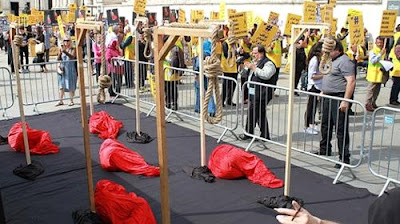 5 September 2017-- Barnet MPs leant their support to a cross section of MPs and political names at a rally in Trafalgar Square.
5 September 2017-- Barnet MPs leant their support to a cross section of MPs and political names at a rally in Trafalgar Square.Theresa Villiers, MP for Chipping Barnet and Matthew Offord, MP for Hendon, leant their support toAnglo-Iranian communities from across the county and other cross-party MPs to call on the government to fight for an indepedent committee to investigate mass executions in Iran in 1988.
Around 30,000 political prisoners were killed under the regime in Iran at that time and Saturday's rally called on officials to raise the issue in the upcoming session of the UN General Assembly and UN Human Rights session later in the month.
Read more
EU Should Seek Justice for Victims of 1988 Massacre in Iran: Alejo Vidal Quadras
 Speaking at a conference in Paris on the sideline of an exhibition revealing horrors of 1988 massacre of political prisoners in Iran, on Thursday, Dr. Alejo Vidal Quadras, President of Brussels based NGO, In Search of Justice (ISJ), and a former Vice-President of the European Parliament called on EU countries to prioritize human rights in their relationship with Iran.
Speaking at a conference in Paris on the sideline of an exhibition revealing horrors of 1988 massacre of political prisoners in Iran, on Thursday, Dr. Alejo Vidal Quadras, President of Brussels based NGO, In Search of Justice (ISJ), and a former Vice-President of the European Parliament called on EU countries to prioritize human rights in their relationship with Iran.Dr. Vidal Quadras said that the campaign for justice for the victims of the 1988 massacre launched by Iranian opposition leader, Maryam Rajavi has “opened the eyes of many people even within the regime and confirmed the potential of the NCRI as a strong and credible alternative to the dictatorship of the mullahs in Iran.”
“The appeal to justice for the victims of the 1988 massacre is now a central element of the Iranian people's resistance to regime change.”
Read more
A Major Rally in London Call on the UK Government to Break Its Silence on the 1988 Massacre in Iran
 Cross party members of the British parliament and political personalities joined the Anglo-Iranian communities from across the UK and called upon the British government to take the lead for the establishment of an independent committee to investigate mass executions of 30,000 political prisoners in 1988 and to bring those responsible to justice. They stressed the time has come to end impunity for Iranian officials who are responsible for serious human rights abuses in the country.
Cross party members of the British parliament and political personalities joined the Anglo-Iranian communities from across the UK and called upon the British government to take the lead for the establishment of an independent committee to investigate mass executions of 30,000 political prisoners in 1988 and to bring those responsible to justice. They stressed the time has come to end impunity for Iranian officials who are responsible for serious human rights abuses in the country.The call was made at a major rally in Trafalgar Square on Saturday, September 2, where participants and speakers urged the UK government to raise the issue at the upcoming session of the UN General Assembly and UN Human Rights session later in September.
Read more
Major Rally in the Hague Calls for Independent International Inquiry Into 1988 Massacre of Political Prisoners in Iran
In a major rally at The Hague, Iranian communities in the Netherlands, Dutch personalities, and international jurists on Saturday, September 2, called upon the Dutch government to take the lead for the establishment of an independent committee to investigate the mass executions of 30,000 political prisoners in Iran in 1988 and to bring those responsible to justice.
The protestors, scores of them relatives of the victims of the 1988 massacre, stressed that the time has come to end impunity for Iranian officials implicated in this crime against humanity and those who are responsible for serious human rights abuses in the country.
Read more
Related:
Amnesty International:Iran Desecrating mass grave site would destroy crucial forensic evidence
In other report Amnesty International on 1 June 2017 mentioned:
The desecration of a mass grave site in Ahvaz, southern Iran that contains the remains of at least 44 people who were extrajudicially executed would destroy vital forensic evidence and scupper opportunities for justice for the mass prisoner killings that took place across the country in 1988, said Amnesty International and Justice for Iran.
Photo and video evidence obtained by the NGO Justice for Iran and reviewed by Amnesty International shows bulldozers working on a construction project directly alongside the mass grave site at Ahvaz, as well as piles of dirt and construction debris surrounding the grave. Although the Iranian authorities have made no official announcements about Ahvaz, families learned through a construction worker that the plan is to ultimately raze the concrete block marking the grave site and build over the area.
Related:
Maryam Rajavi’s message to the Berlin gathering Commemorating victims of the 1988 massacreAguest 29, 2015
https://plus.google.com/u/0/115000766128351373575
https://www.facebook.com/freedomforiniran.blogspot.al/
Freedom4Iran
@FreeIransyria



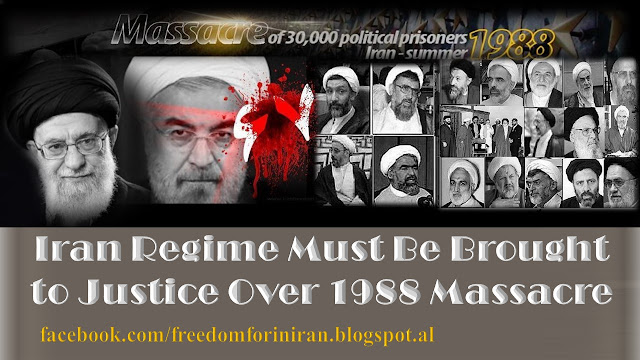
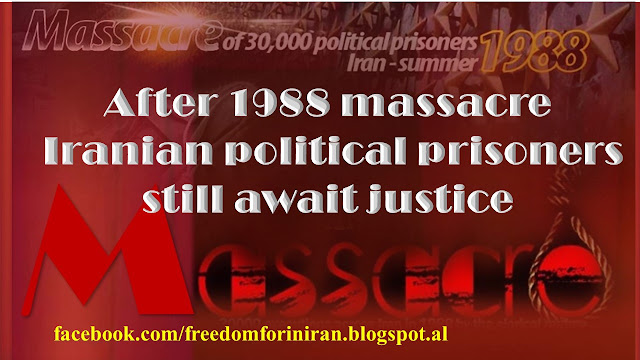



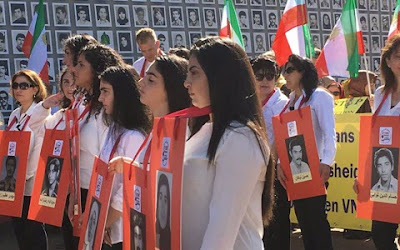


sabung ayambangkok..
ReplyDelete